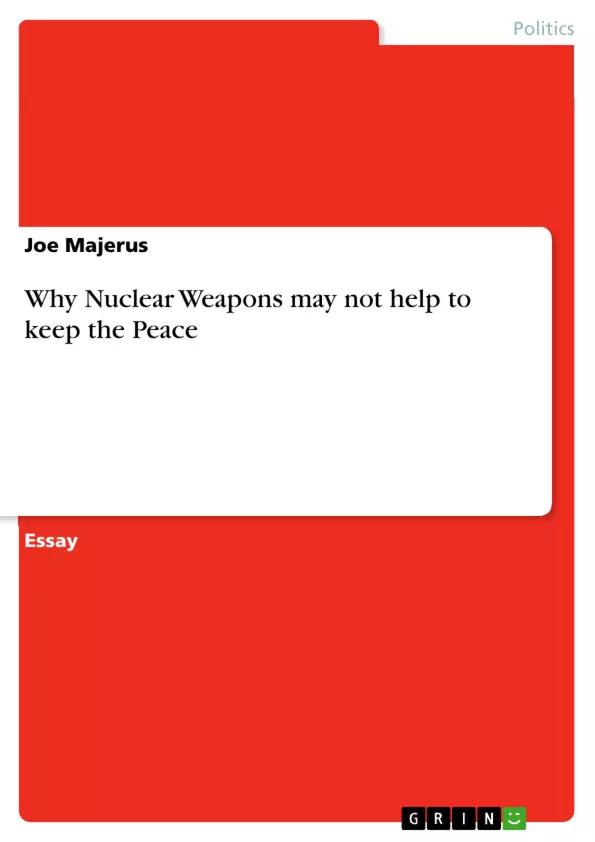Nuclear weapons undeniably constituted a powerful deterrent against the renewed outbreak of major international conflict in the past seven decades, yet it would be wrong to infer from that reality that they might consequently always serve as an unfailing source of peace, stability and mutual security. Supposing them capable of doing so by mere virtue of their destructive potential and/or presumed stabilizing powers is essentially to discount that whatever agency they may have for underwriting peace and stability ultimately does not issue from their physical presence alone, but rather from the distinct set of international arrangements and conditions under which they actually exist. Any major change in the basic fabric of that order likely stands to not only sharply decrease their capacity at deterrence, but may likewise turn them into a dangerous mechanism for undermining the very 'nuclear peace' which some neo-realists erroneously credit these armaments capable of maintaining irrespective of the historical circumstances surrounding them.
Inhaltsverzeichnis (Table of Contents)
- Irrational Behaviour
Zielsetzung und Themenschwerpunkte (Objectives and Key Themes)
The essay aims to examine the assertion that nuclear weapons maintain international peace. It challenges the notion that nuclear weapons inherently guarantee peace, arguing that their effectiveness depends on several crucial factors.
- The role of rational decision-making in nuclear deterrence
- The distinction between deterrence and compellence in nuclear strategy
- The influence of strategic environment and international relations on nuclear weapons' effectiveness
- The limitations of rational actor models in international politics
- Case studies illustrating the potential for irrational behavior and unintended consequences
Zusammenfassung der Kapitel (Chapter Summaries)
Irrational Behaviour: This chapter delves into the crucial role of rational decision-making in ensuring that nuclear weapons serve as a deterrent rather than a catalyst for conflict. The author challenges the assumption that rational actors will always prevail in international relations, highlighting several factors that can cloud judgment, such as flawed intelligence, misperceptions of adversaries, institutional pressures, and disproportionate threat assessments. The chapter uses the 1962 Cuban Missile Crisis as a prime example, demonstrating how even with the potential for nuclear conflict, cooler heads ultimately prevailed due to careful consideration rather than solely rational behavior. The chapter underscores that while rational decision-making is ideal for nuclear deterrence, it's not a guaranteed aspect of international politics, therefore rendering the idea that nuclear weapons invariably maintain peace an unreliable assumption.
Schlüsselwörter (Keywords)
Nuclear weapons, deterrence, compellence, rational decision-making, international relations, Cuban Missile Crisis, irrational behavior, strategic environment, security, peace.
Frequently Asked Questions: A Comprehensive Language Preview
What is the main topic of this essay?
The essay examines the assertion that nuclear weapons maintain international peace. It challenges this notion, arguing that their effectiveness depends on various factors beyond the simple presence of the weapons themselves.
What are the key themes explored in this essay?
Key themes include the role of rational decision-making in nuclear deterrence, the difference between deterrence and compellence, the impact of the strategic environment and international relations on nuclear weapons' effectiveness, the limitations of rational actor models in international politics, and case studies illustrating the potential for irrational behavior and unintended consequences.
What is the significance of rational decision-making in the context of nuclear weapons?
The essay highlights the crucial role of rational decision-making in ensuring that nuclear weapons serve as a deterrent. It challenges the assumption that rational actors will always prevail in international relations, acknowledging factors like flawed intelligence and misperceptions that can lead to irrational choices.
How does the essay address the concept of deterrence and compellence?
The essay distinguishes between deterrence (preventing an attack) and compellence (forcing an action). It likely analyzes how these concepts relate to nuclear strategy and the complexities of their application in the real world.
What is the role of the Cuban Missile Crisis in this analysis?
The 1962 Cuban Missile Crisis serves as a case study to illustrate how even with the potential for nuclear conflict, cooler heads (careful consideration, not necessarily pure rationality) can prevail. It demonstrates the limitations of relying solely on the assumption of rational behavior in international relations.
What are the limitations of rational actor models in international politics, according to this essay?
The essay argues that rational actor models, which assume perfectly rational decision-making by all actors, are overly simplistic and insufficient to explain the complexities of international relations, particularly concerning nuclear weapons.
What are the key takeaways from the chapter on "Irrational Behavior"?
The chapter emphasizes that while rational decision-making is ideal for nuclear deterrence, it's not guaranteed in international politics. The essay therefore concludes that the idea that nuclear weapons invariably maintain peace is an unreliable assumption.
What are the keywords associated with this essay?
Keywords include: Nuclear weapons, deterrence, compellence, rational decision-making, international relations, Cuban Missile Crisis, irrational behavior, strategic environment, security, and peace.
What does the Table of Contents reveal about the structure of the essay?
The Table of Contents, at a minimum, indicates the inclusion of a chapter on "Irrational Behavior". It suggests a structured approach, likely moving from theoretical discussions of nuclear strategy to practical examples and analysis.
What is the overall conclusion of this essay likely to be?
The essay likely concludes that while nuclear weapons can act as a deterrent, their role in maintaining international peace is far more nuanced and complex than commonly assumed. The potential for irrational behavior and unintended consequences significantly undermines the simple assertion that nuclear weapons guarantee peace.
- Quote paper
- Joe Majerus (Author), 2013, Why Nuclear Weapons may not help to keep the Peace, Munich, GRIN Verlag, https://www.grin.com/document/284044



